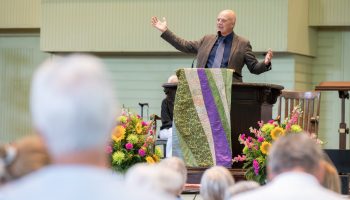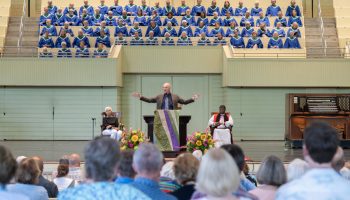
The Rev. Canon Stephanie Spellers’ sermon, titled “Now You’re the Light,” opened with another enlivening song that she noted will likely be familiar to many. Voices rose joyfully Wednesday morning in the Amphitheater, in a spirited rendition of “This Little Light of Mine.” But this wasn’t meant to be only an opening prayer; it was a call to action.
Spellers began her sermon with a poignant story about a group of Sufi disciples gathered around their dying teacher, their hearts heavy with fear and uncertainty. They asked how they would know what to do once their guide was gone. The teacher replied, “I am nothing but a finger pointing at the moon. Perhaps when I am gone, you will see the moon.” Like the opening song, the sentiment of this story may also be familiar for us.
Spellers explained, “We look at the people who have so obviously been full of God, and we call them prophets and saints. Or we look to the great liberation movements and leaders that have changed human existence in our own lifetime, and we set them up high on pedestals or out ahead in the distance.”
Then turning to the two scriptures grounding the service, 2 Kings 2:11–14 and John 1:1–5, 10–14a, Spellers referenced the story from 2 Kings, explaining how Elisha was a young man working in the fields when Elijah called him to follow. She recounted how Elisha watches his mentor being taken up to heaven in a whirlwind, leaving behind only his mantle. So with trembling hands, Elisha picks up Elijah’s mantle and strikes the water. Miraculously, the river parts. The Spirit that rested on Elijah has come to rest on him, too.
“Elisha didn’t believe he had this power, not in the beginning.” He looked up to Elijah, admired him, but never truly believed that the Spirit could also rest on someone like him. “He was looking at the finger instead of the moon,” Spellers said. She went on to describe how people can often admire spiritual leaders and prophets without realizing those figures are pointing beyond themselves, to God, to Light.
The second scripture of the day was from the Gospel of John, which reads, “In the beginning was the Word, and the Word was with God, and the Word was God. … And the Word became flesh and lived among us.” Spellers pointed to this bridge between God and God’s creation, which draws us close enough “to taste and to touch, to know and to love God.”
The Word, she reminded the congregation, is the Light of the world. This is a light we can gaze upon and even behold with gratitude and worship. However, Spellers contended, “Y’all, it’s not enough.” Certainly we are meant to admire and worship the Light, but we are also invited to become more like the Light.
Echoing the transformative vision found in this text, Spellers spoke of the divine power given to us to become children of God, not born of blood or human will, but of God. And, as Jesus promises later in the same Gospel, those who follow his teachings are called not just to observe his good works, but to do them as well.
Spellers went on to quote the Danish theologian and philosopher Søren Kierkegaard who spoke about how Jesus did not ask for admirers or worshippers, but rather for disciples. She explained that admirers may feel inspired but remain unchanged and unwilling to take transformative risks. Followers, on the other hand, strive to live what they believe, knowing it may reshape their lives.
This idea, Spellers suggested, applies across traditions. “Every faith is built around a finger, a teacher, a holy one pointing a way for us to follow,” she said, naming Moses, Muhammad, the Buddha and Jesus, among others. But the question remains: Do we simply watch the finger, or do we walk toward the light it points to?
Returning to the image of Elisha at the bank of the Jordan River: At first, he cries out at being suddenly separated from his mentor. Then, he remembers who he is and whose Spirit he now carries. So, picking up the mantle, he acts. Spellers concluded her sermon by encouraging the congregation that they too are invited to take up the mantle, to act in faith. Prophetic teachers and guides across many traditions invite such transformative action. “These aren’t just stories of ‘Once upon a time,’ ” Spellers urged. “Yes, please look to the prophets. Look to the holy ones who have come before. And yes, look to Jesus. But then follow. Follow their pointing fingers. Follow the path they laid out. … You were meant to be a powerful force for love. We were all meant to be the light, too.”
The Rev. John Morgan, pastor of the Williamsburg Presbyterian Church in Virginia and board member of the Presbyterian Association, presided. Melissa Spas, vice president for religion at Chautauqua Institution, read the scripture. Owen Reyda, organ scholar, performed the prelude on the Massey Memorial Organ: Allegretto in F Major, by Alan Gray. The Motet Choir sang “Shine Like the Sun,” by Karen E. Black and John C. Ylvisaker, under the direction of Joshua Stafford, director of sacred music and Jared Jacobsen Chair for the Organist, and accompanied by Reyda on the Massey organ and Barbara Hois on flute. For the postlude, Stafford performed “Joie et clarté des corps glorieux,” by Olivier Messiaen, on the Massey organ. Support for this week’s services and chaplaincy is provided by the John William Tyrrell Endowment for Religion. Mary Lee Talbot will return to her morning worship column for Friday’s newspaper.




